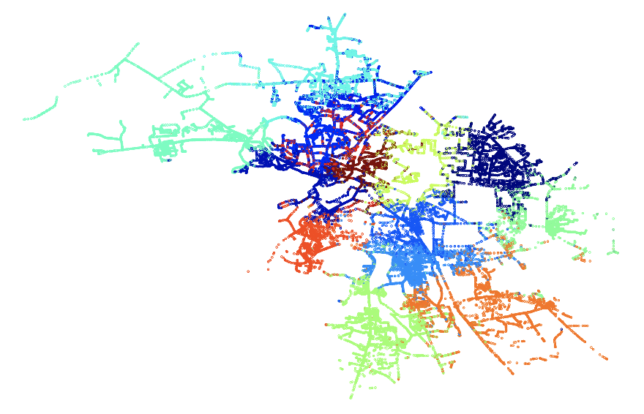OrbiLoc is an Innosuisse project in which the Data Mining and Machine Learning (DMML) group collaborates with the company Orbiwise. The goal of this project is to improve the localization accuracy achieved by IoT devices utilizing the LoRa network of Orbiwise. In the context of this project, DMML introduces machine learning techniques for localization, achieving significant performance improvements, having as a baseline the trilateration method currently used by Orbiwise. The percentage of improvement of the localization accuracy achieved lays in the range of 30%-55%, depending on the environment of the deployment.

Clustering of signal reception locations in an urban environment, based on the received signals by the LoRaWAN infrastructure.
 In the OrbiLoc project, the expertise and the resources of Orbiwise have been indispensable for the research team of DMML. Orbiwise specializes in the development of advanced technologies for IoT providers, maximizing the performance of their service. More specifically, Orbiwise specializes on the LoRaWAN standard. Orbiwise has been responsible for the collection of datasets from deployments of LoRaWAN networks in different cities. These datasets are used for building and evaluating the machine learning models that produce position estimates.
In the OrbiLoc project, the expertise and the resources of Orbiwise have been indispensable for the research team of DMML. Orbiwise specializes in the development of advanced technologies for IoT providers, maximizing the performance of their service. More specifically, Orbiwise specializes on the LoRaWAN standard. Orbiwise has been responsible for the collection of datasets from deployments of LoRaWAN networks in different cities. These datasets are used for building and evaluating the machine learning models that produce position estimates.
Using machine learning methods for localization has been a common approach for the indoor positioning community. The most common aproach used indoors, has been the use of a simple k nearest neighbor (knn) method. In the context of Orbiwise, where IoT devices should be localized outdoors, a broad range of machine learning techniques (such as SVMs, Random Forests or Neural Networks), prepossessing and of feature engineering methods are evaluated. The end goal is to determine the model which may achieve the greatest reduction of the localization error.
An overview of the subject of outdoor localization of IoT devices is described in our recent blog post.
The study of ML methods for positioning IoT devices outdoors, in the context of the OrbiLoc project, has given as fruit the publication of two relevant research papers, whose preprints are available here:
- A Reproducible Comparison of RSSI Fingerprinting Localization Methods Using LoRaWAN - arxiv.org/abs/1908.05085
- A Reproducible Analysis of RSSI Fingerprinting for Outdoor Localization Using Sigfox: Preprocessing and Hyperparameter Tuning - arxiv.org/abs/1908.06851
Results at a glance:
The positioning accuracy achieved by ML methods proposed by DMML is significantly higher that the one achieved by the multilateration baseline. Depending on the dataset used, the improvement of the mean error was at the range of 31%-54%, and of the median error 36%-52%.